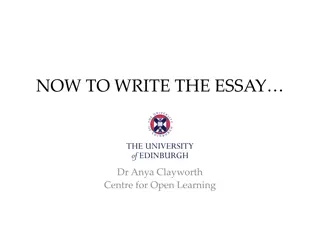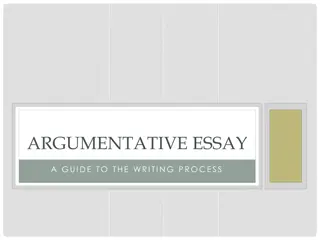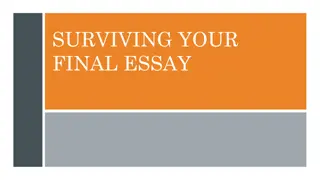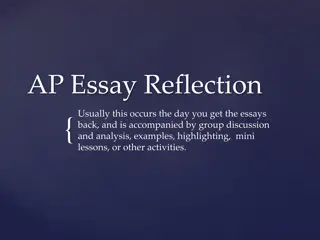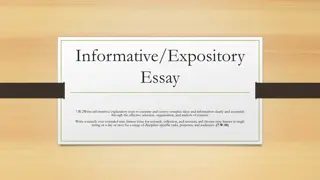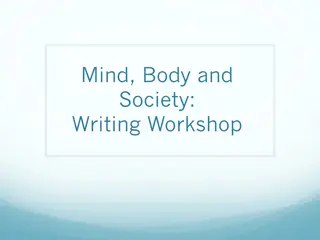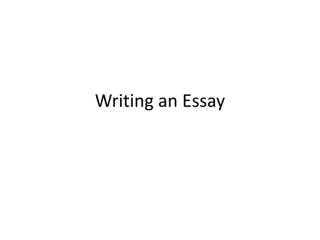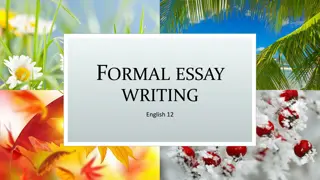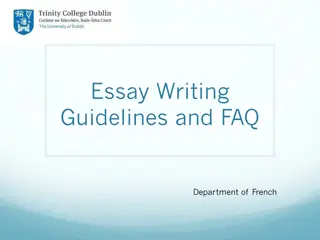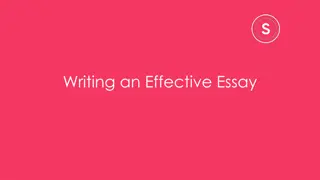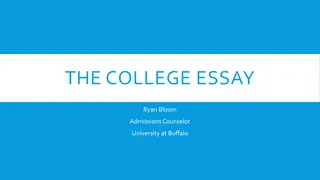Mastering Legal Essay Questions: Essential Tips and Strategies
Enhance your legal reasoning skills by understanding how to effectively structure and approach essay questions. Learn key techniques such as starting with outlining your points, avoiding common mistakes, and focusing on important legal aspects. By following these guidelines, you will be better equipped to excel in answering legal essay questions successfully.
Uploaded on Oct 02, 2024 | 0 Views
Download Presentation

Please find below an Image/Link to download the presentation.
The content on the website is provided AS IS for your information and personal use only. It may not be sold, licensed, or shared on other websites without obtaining consent from the author.If you encounter any issues during the download, it is possible that the publisher has removed the file from their server.
You are allowed to download the files provided on this website for personal or commercial use, subject to the condition that they are used lawfully. All files are the property of their respective owners.
The content on the website is provided AS IS for your information and personal use only. It may not be sold, licensed, or shared on other websites without obtaining consent from the author.
E N D
Presentation Transcript
Module 2: The Basics of Legal Reasoning LAW1231: Lecture 9 10 Putting it All Together Part 2 Essay Questions
Learning Objectives By the end of the lecture, you will be able to: Structure and organize essays Describe the three main types of legal essays Recognize different types of examination essay questions.
Introduction Answering Essay Questions is an important Examination Skill. There are some law topics that lend themselves more easily to assessment by essay than to problem questions. Some of your examiners will require you to answer at least one essay question. In these 2 lectures you will learn how to scrutinize exam questions and how to organize your answers. What shows the lecturer that you have paid attention in class and can think like a lawyer?
Answering Essay Questions Where to Start? Always start by thinking about what YOU want to say. Take a step back before you answer. Write an outline of the points you want to make. Check your outline to ensure that you are answering the question.
Answering Essay Questions Tip: What Not To Do Note that there are some students who might correctly identify what the question is asking but find themselves unable to properly respond. They might write an essay like this: Lizards of the Caribbean Lizards are green and are amphibians. They live in all continents except Antarctica. Lizards range in size from Lizards eat Lizards are threatened by The lifecycle of lizards is Some lizards live in the Caribbean. Do not do this!
Answering Essay Questions Tip: What Not To Do Students might also write an essay like this: Lizards of the Caribbean Lizards are green and are amphibians. To that extent, they are like frogs. There are several species of frogs. These are : Frogs live in a variety of habitats such as Some frogs are nocturnal. This means that Frogs are threatened by pollution, habitat loss Do not do this either!
Answering Essay Questions Here is a better outline Lizards of the Caribbean Types of lizards found in the Caribbean Special characteristics of Caribbean lizards Habitat of Caribbean lizards Threats to Caribbean lizards Keep looking back at the question to make sure that you are answering it.
Answering Essay Questions Types of Legal Essays When you start the essay (and even when prepping for your exam), ask yourself what is important in the law in that area. Is it: 1. Legal history? 2. Legal theory? 3. Legal reform? Categories suggested by Bloomsbury Law Tutors: http://lawtutors.co.uk/how-to-write-first-class-law-essays/
Answering Essay Questions Types of Legal Essays The historical essay: is often the easiest you give an evolution of a doctrine. However, in order to gain marks, you will still require a critical analysis have there been any opponents of how the doctrine evolved?
Answering Essay Questions Types of Essays Cont d The legal theory essay : requires you to explain why the law takes the particular shape and form that it does. While some history might be important, this essay will focus more on analysis of a particular doctrine, often by in-depth discussion of a few cases, giving an explanation of why the courts came to certain results. The legal reform question : requires knowledge of the gaps in the present law. Sometimes you will be asked whether the present law should be reformed. Other times you will be asked whether a current or proposed reform fills the necessary gaps and whether it raises any new problems.
Answering Essay Questions The Wording of Essay Questions It is important to pay attention to how the questions are worded. They may sometimes seem obtuse and may at other times be completely deceptive. The trick is to remember that exam questions will generally focus on some controversy that your lecturer has highlighted in class. (Unfortunately there will always be lecturers who give essays on areas not specifically dealt with in class but which appeared on the worksheet for self-study. If the question or quotation isn t ringing any bells, then leave it alone and move on no point in wasting time.)
Answering Essay Questions Example #1 A Straightforward Question The Criminal Law essay from a past paper reads: "It is firmly established by a host of authorities that mens rea is an essential ingredient of every offence unless some reason can be found for holding that that is not necessary." Per Lord Reid in Sweet v Parsley [1970] AC 132 Critically discuss this statement with reference to the relevant authorities. This is a fairly typical essay question you are given a quote from a case and asked to critically discuss it.
Answering Essay Questions Example #1 - A Straightforward Question "It is firmly established by a host of authorities that mens rea is an essential ingredient of every offence unless some reason can be found for holding that that is not necessary." Per Lord Reid in Sweet v Parsley [1970] AC 132 Critically discuss this statement with reference to the relevant authorities. What is important here is to decide whether it is a broad question or a narrow one. A poor student might simply write an essay giving everything known about mens rea. This would be wrong. Rather, this question deals mostly with the narrower area relating to offences of strict liability (guilty whether you intended an offence or not). Most of the essay should be devoted to discussing only that aspect.
Answering Essay Questions Example #2 - A Convoluted Quote Make sure you read each word of the quote carefully they can get very convoluted! For example: That Equity, Like the Common Law, should in its adolescence become secular, and thus sacrifice its quest for abstract justice on the alter of technicalities was inevitable. Comment. (Equitable Remedies)
Answering Essay Questions Example #2 - A Convoluted Quote One nice thing about this question is that it gives you a road map. The hard part is to untangle it. That Equity, Like the Common Law, should in its adolescence become secular, and thus sacrifice its quest for abstract justice on the alter of technicalities was inevitable. Comment. (Equitable Remedies) You would address whether: 1. equity has become secular and rigid. (It had its basis in religious law). 2. this move became more pronounced as the law evolved (its adolescence). 3. this happened to the common law. 4. there are any similarities between equity and the common law that made this progression, if it occurred, inevitable.
Answering Essay Questions Example #3 - A Deceptive Question Sometimes the question might seem straightforward and simple. For example: Critically assess Austin s Command Theory of Law (Jurisprudence) This question is actually one of the most difficult ecen though it might seem open-ended. The student who only examines Austin s theory will probably not do very well. Students will do better if they show the flaws in the theory and also compare the theory to other theories and say whether those other theories fix the flaws. [NB: There is an unfortunate habit that some students develop of trying to spot exam questions by only revising certain areas. Doing that will get you in trouble if there is a question like this that overlaps several areas.]
Readings & Resources (Required) Reynolds v. Times Newspapers Ltd and Others [1999] UKHL 45; [1999] 4 All ER 609; [1999] 3 WLR 1010 (28th October, 1999)
Learning Activity 9.1 Tutorial Activity Learning Activity Ungraded 9.1 Tutorial 5: Please see a link to Tutorial 5 WORD file on the Learning Exchange (please refer to the required reading file above to attempt this tutorial).
Summary In this Lecture we looked at how to approach essay questions on exams. We considered how to interpret the questions. We also learned that there are generally three categories (legal history, legal theory and law reform), and we discussed the highlights of each type.






